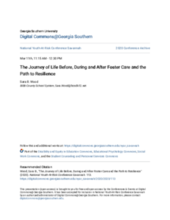Displaying 461 - 470 of 2221
The current study seeks to explore clinicians' and parents' perspectives regarding the role of psychotherapy services (e.g. individual or conjoint counselling/therapy) for child welfare cases.
The purpose of the present study was to examine how maltreatment chronicity and coping style were associated with internalizing, externalizing, and psychiatric hospitalizations, and whether coping style moderated the relation between maltreatment chronicity and mental health in a sample of foster adolescents.
The authors of this study used a retrospective cohort design with linked administrative data on 296,422 children to examine the relationship between school absenteeism and child protection system (CPS) involvement.
The authors of this study conducted a randomized controlled trial to investigate the efficacy of a parent group training tailored to the special needs of foster families.
This study investigates tensions between stated goals and experiences of foster care, from the perspective of (formerly) fostered youth.
This presentation will begin in the form of a story—a story of a real, in the human flesh person who came into the foster care system as a victim of abuse and neglect and left as a college graduate and continued her success as a social worker, child advocate, Statewide Youth Advisory Board Coordinator, and educator.
This presentation explores the structures and programs one university system is creating for college students emerging from foster care (SEFC).
This article offers a comprehensive look at the LGBTQ foster youth population in the U.S., its vulnerabilities, and its distinct needs.
This chapter of Foster Care and Best Interests of the Child provides an overview of the foster care system in the United States.
This chapter of Foster Care and Best Interests of the Child first describes how foster care, intended as a temporary but necessary solution for children who cannot safely remain at home, is increasingly described as a problem in and of itself rather than as a solution to a difficult problem.

